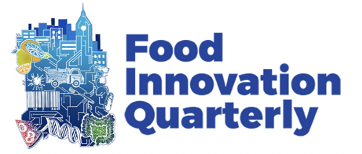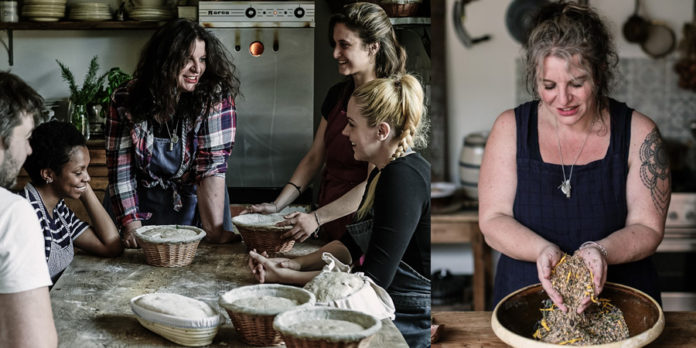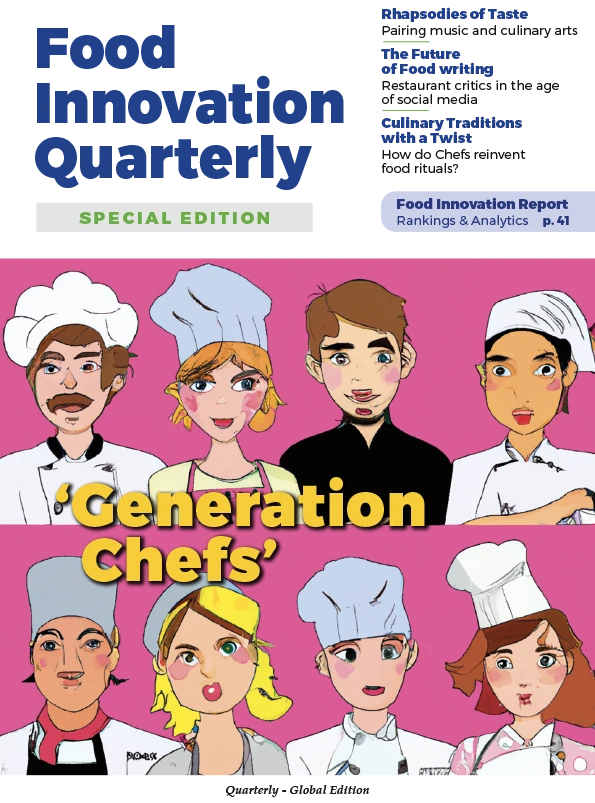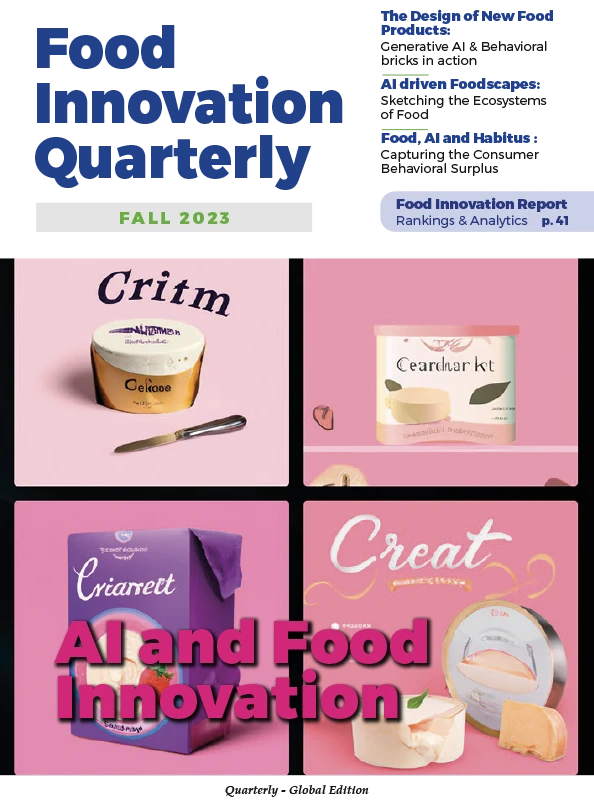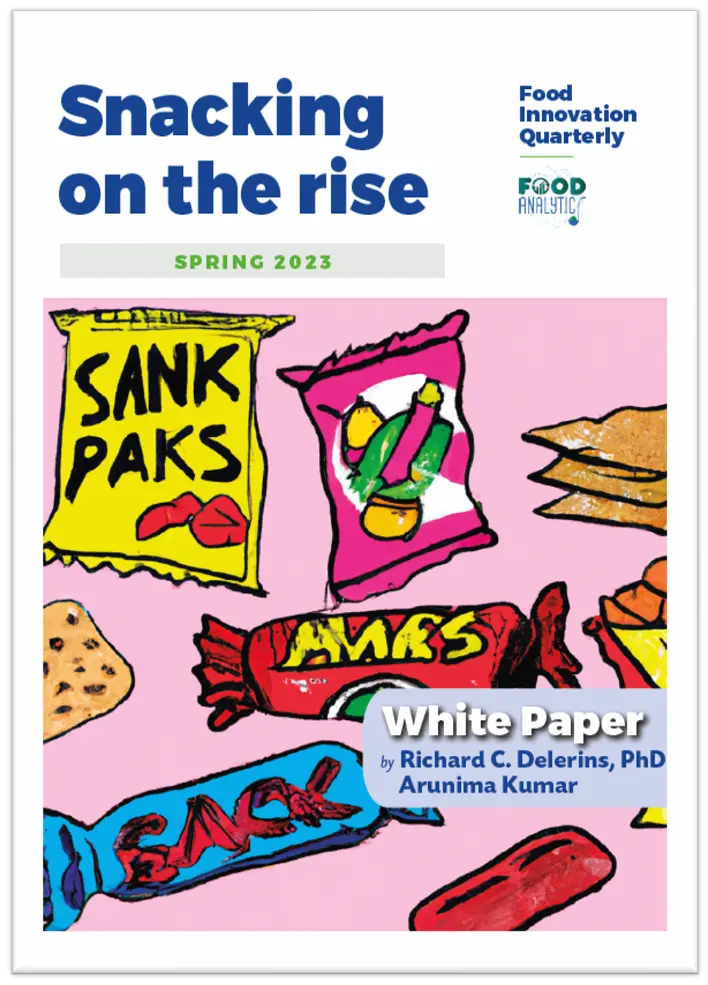The author’s ‘The Sourdough School’ was dubbed as the most important book of the year (2018). Its sequel, ‘The Sourdough School: Sweet Baking’, was published in 2021, laying down a foundation for understanding the relationship between the gut microbiome and physical & mental health. This interview is a conversation on her learnings & contributions to the world of sourdough.
Food Innovation Quarterly: We gather that you have Italian roots, right?
Vanessa Kimbell: Well yes, I suppose, I have an Italian mother so I have the Italian innate passion for feeding people. I also have French DNA. I’m actually quite French, and I was brought up on and off for many, many years in the doing. So, I have a French style and, of course, English manners.
FIQ.: How was your relationship with bread and baking growing up?
V.K.: Well, I grew up baking in a little bakery, in a village called Nadaillac in southwest France, Dordogne. I would have been ten or eleven years old, and my bedroom was just to the right of the chimney, so as the baker would fire up his wood fired oven, the oak smoke would curl up into my bedroom and wake me up. And I would creep down the stairs, run down the alleyway and I would throw myself in the door of the bakery.
Sometimes, the mayor would be in line outside. The epitome of being French, from the most important person in the village, to the least important, everybody in the village ate the same bread!
FIQ.: This was not the case in England?
V.K.: The English would be eating white sliced industrial bread, and at school we would have to sit bolt upright, eating cucumber sandwiches with crusts cut off, sipping tea. But the French… Oh my god! They would have this bread, and they would go ‘Oh oui’, and they would make these noises. They would drag this bread through the sauce on the plate in the restaurant, and they would show this pleasure, ‘le plaisir’, and this blew my brains out. That was to me everything good about being in France.
FIQ.: What was the motivation behind starting the Sourdough school?
V.K.: I went against my mother’s wishes to go into medicine or law, and I trained to be a baker. I had a very good education. She wanted me to be a doctor, and ironically the full circle is that I now teach doctors! Actually, I will be a doctor, because I’m just in the final year of my doctorate in Nutrition & Digestibility of Bread & The Gut Microbiome.
In my twenties, I went back to France, and then in England I trained for three years. Just as I was really about to take off as a newly qualified young ambitious baker, I literally could not eat bread. I ended up with a non-celiac gluten sensitivity, but I also ended up simultaneously with IBS! So, there I was, this baker who couldn’t bake, and I can only describe it like trying to be a vegetarian butcher: It just doesn’t work!
When I got ‘home’ back to England, I went to the supermarket and I bought some bread and within maybe 45 minutes of eating it, I went sick and that’s when I realized I have to see a doctor to ask ‘why can I eat French bread and not English bread?’. This is insane. So, I went to see the English doctor and I said ‘look, I can eat this French Bread, but not English Bread, so what’s going on?’. And he leaned back in his chair, looking very wise, he stroked his chin like Tom Wyatt and he said ‘I have no idea’.
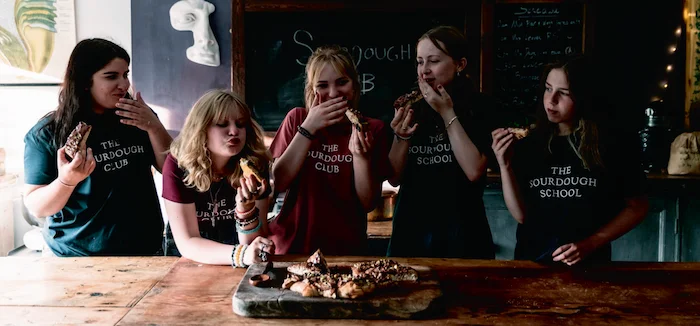
FIQ.: (laugh)
V.K.: That was it! But I was like, ‘I need to know and the doctor can’t tell me’, I wanted it clear. What they actually do at places like Royal College of General Practitioners, nowadays, is teach and apply the knowledge of the research on the gut microbiome to
the doctors, nutritionists, dieticians, gastroenterologists and all of the high-level people who advise others because removing bread from the diet is actually detrimental to health.
FIQ.: That is to say?
V.K. : It’s a cheap, easy, readily available source of fibre which is really good for the gut. No one bread is created equal, the word bread covers everything from the worst English invention ever, duly white bread, through to my diversity breads, which are milled from the meadow, The key to gut health, actually one of the keys, apart from fibre, is diversity. So, my grains, and what I mill into flour is the whole meadow…
FIQ.: We can actually see a part of this process with various grains on your website.
V.K.: Yes, with roses, oregano, oats, barley, rye and wild mint… This week I’m milling blackcurrants, black berries, rose hips & fennel in my bread. As part of my doctorate and my studies into nutrition and digestibility, I developed these blends because along the journey in 2016, I met professor Tim Spector, and he identified that my diversity at that point was less than two percent diversity, and in 2016, 2017, I had a full gut microbial transplant… I had 12 transplants, and that transformed my health.
FIQ.: It seems to be huge… How did it go?
V.K.: It was an experiment, I was part of a study, so I didn’t do it myself. It was done clinically. It’s radical, I understand that… What he’s doing and having to nurture and know that I had a new opportunity, my doctorate and my work in nutrition and digestibility in bread made me go back and look at how we evolved, my lens is evolutionary theory. And I sort of realized that a Neolithic man wasn’t wandering around picking spelt grain. It was like ‘I’ll eat what I can get, whatever is available’, basically because he wasn’t picking little single grains out going off there tonight, darling…
So, we evolved with microbiology, we evolved with fermentation, we evolved with the amylase in our mouths to breakdown starches, and we evolved as out there.
There’s actually evidence and I guess it’s our botanical evidence, we were milling seagrams 100,000 years ago. You know, in Mozambique they found evidence of grass seed consumption, between stones. So, I know that we evolved, and as soon as you start breaking down the grains, they start a natural fermentation, the enzyme growth of seeds. It’s a bacterial and enzymatic breakdown, which is essentially what Sabado is, it’s a symbiotic relationship between lactic acid bacteria, acetic acid bacteria, wild yeast enzymes and oxygen in the brain.
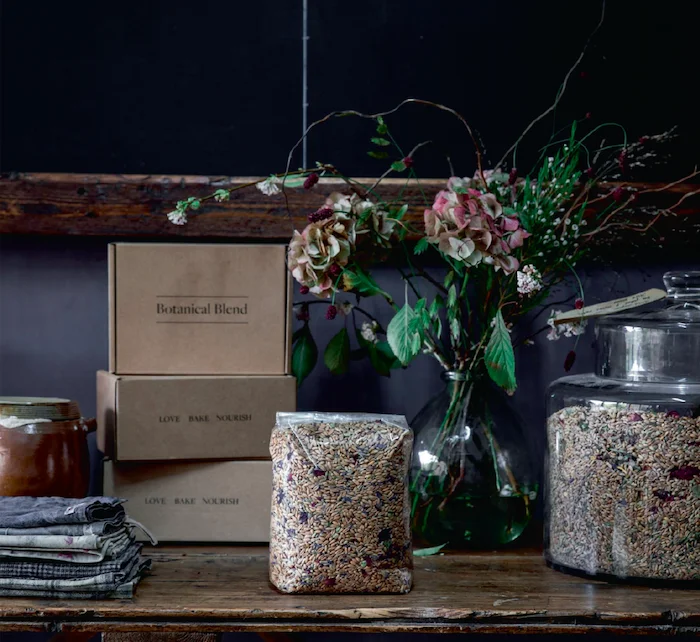
And that relationship, I believe, is core to our own development. When you look at all of the social systems and you look at everything from kissing to sharing bread, to eating together, to bathing together, there’s Japanese studies on bathing being a great way of swapping microbes. You realize that it was in the best interests of the microbes that we were cognitively designed to share bread.
FIQ.: Industry not only changes the taste, but also our bodies?
V.K.: Yes, in removing the fibre and adding in emulsifiers that actually damaged the gut lining, and creating a very stressful environment with high levels of antibiotics and high levels of stress, high levels of refined food
and food that lacks fibre, I believe that to our huge detriment, we have devolved. So, we evolved one way, and we’re now ‘devolving’. And when you look at the importance of a basic food like bread, the price of bread, the percentage of calories that wheat has in everyday diet, you look at the affordability of bread, which is, you know, the cheapest food out there, I mean, apart from fresh air, clean water, bread really is the basic human right as far as I’m concerned.
FIQ.: Is bread a life essential? And is there a correlation between microbial diversity and mental health?
V.K.: Bread is this… It’s almost like we have the very best and the very worst in the same opportunity, to nourish or to poison. I mean, it’s almost as simple as that. Your gut when it is optimally functioning provides the basic metabolites for your brain to function, and GABA, which calms anxiety down, it provides dopamine. It provides serotonin, which is the precursor to melatonin which helps you sleep.
When you do know the body, what it needs to function and what it needs for the brain to function at the very first, you know, this is really basic stuff for your brain working. And you watch the epidemic of physiological and mental illness associated with lack of fibre and the resulting damage done by first fermented gluten that is unbroken down, so the proteins are still whole. I believe that we have to change something called the paradigm of bread. And to do that, we start with looking at the fact that the very base ingredient, the flour, is a monoculture. If you start with a premise, the very simple premise is the wider diversity of the gut microbiome.
The more robust your health and the wider the food that you feed your biome, the better it is than monoculture just feeding it one grain. All the fibre wiped out is tantamount to slowly poisoning yourself, so we have to look at flour, fibre fermentation, as well as the way that we eat bread, so we have to eat it the French way, with polyphenols, high polyphenol, rest of all red wine, unpasteurized cheese and the lifestyle where you eat and you enjoy and you take the time to appreciate your food. It’s complementary to nourishing the gut, and with a good strong gut, you can eat lots of different
things, but if your gut has been damaged, you stop enjoying your food and then that only really leaves sex left actually, and maybe money.
‘And I sort of realized that a Neolitic man wasn’t wandering around picking spelt grain. It was like ‘I’ll eat what I can get, whatever is available.’
FIQ.: People usually would go round saying gut is your second brain, what do you think about it?
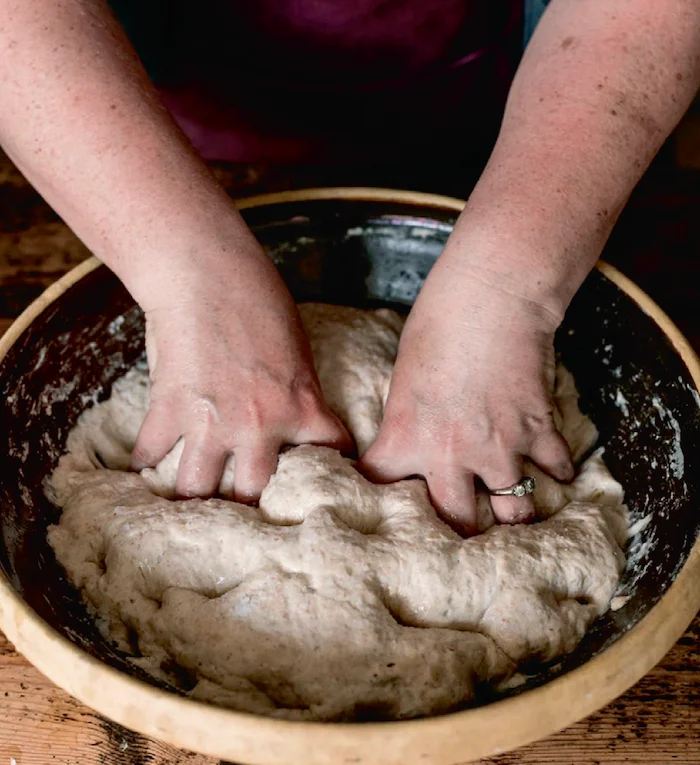
V.K.: Bloody nonsense, absolute nonsense, it’s your first brain! All these scientists say it’s your second brain… It’s your first brain! We’re very arrogant to think we evolved cognitively first, our guts evolved, then our brains evolved. It’s the first brain, not the second brain… You can talk to all the scientists you like… I’m just a baker (smile).
FIQ.: Your book won the World Book Award for the most ethical and sustainable book in 2009, and The Sourdough School has been hailed as the most
important book of the year almost a decade later. Do you think the food and beverage industry is finally catching up with the importance of the role of gut microbiome in not only our physical but also in mental health?
V.K.: Funny question… Yes and no! I think that most individuals who are interested in their health and wellness are now tuning in to the importance of nourishing their gut. I am seeing a lot of marketing spiel from companies who feel that pushing the word ‘gut- friendly’ on something is an acceptable way of making people think it’s OK to eat rubbish.
And it’s made complex by people trying to profit out of misunderstanding, so my advice is read the ingredients on the packets. Look for whole grain, look for the amount of fibre and really with bread, I guess. I’ve just brought out a book called ‘Ten Minutes Sourdough’. This book came out last week. With that, you can make the bread that I teach in 10 minutes… Ten. So, you can put 10 years of my research into 10 minutes of bread. That’s good, isn’t it? It took some doing, I can tell you.
FIQ.: Did you notice a shift in the outlook of baking and fermentation and mindful eating during the last year during the pandemic?
V.K.: Yes, I’ve got half a million backers who follow me. So, I would hope after 10 years of jabbering away on social media that some of them might have listened to me.
FIQ.: Did you also notice the change in the number of the people interested in your courses or your work in general?
V.K.: Before lockdown, I had a two-year waiting list. Even before lockdown, one of the difficulties was that I can’t teach as many people as I want should learn, so we have an online course as well. So, I can’t teach everybody in person as much as I would like to. Now, possible said the books! Books are a really easy way for me to put my knowledge in people’s hands.
FIQ.: You said you could eat French bread and not English bread. Actually, for some French people with gut issues, it’s not possible to eat the usual French bread, because not all of it comes from stone ground flours.
V.K.: I think the point is not stone-ground flours but fermentation. The fermentation process degrades the gluten that is inflammatory and the acidification facilitates the fight in enzymes that degrades the phytic acid that stops you from having wind and IBS. It triggers the proteolytic enzymes, so the protein & glutens are broken down, making them less inflammatory.
FIQ.: What is your vision about the gluten free market, whether it is for bread or some other food ?
V.K.: I’m not sure I did say that I had English manners earlier, so being terribly rude about it wouldn’t be very nice, would it? (laugh) I believe that there is a lot of misinformation out there. I believe that manufacturers think that by sticking the label gluten free on, it’s healthy, when in fact it’s still starving your microbes of fibre. There are dangers for people who have celiac, in a sense that there’s associations with other diseases that could very well be in part driven by lack of fibre.
And when you take out the big player, fibre, out of your diet, the cheapest most available fibre there is, it’s dangerous in the long term for your gut. And one of the things that happens is that you go gluten free, and the people who self-diagnose are starving the microbes that break the gluten down.
‘To our huge detriment, we evolved one way, and we’re now ‘devolving’.‘
So, you’re creating the very problem that you thought you self-diagnosed and you didn’t have. You have to be medically diagnosed with a gluten allergy such as celiac to genuinely have to avoid gluten. And there are times when people do need to have wheat gluten. But most people are using gluten free, if you watch them carefully, they do not honour the gluten free, they just do it because it’s a fad and they think this is something that might be healthy for them.
FIQ.: So, your last advice would be ‘make your own bread or find a French soulmate, if possible’?
V.K.: Yeah (laugh) I would say, find a man that makes good bread, find a good baker, they have good hands… Good bread is available to all. I mean, I keep coming back to it, but fresh air, clean water, and bread nourishes. Bread is good for you.
It’s a basic human right to eat something that is good for you. And the thing is not just good for your taste, it is good for your gut microbiome. We’re symbiotic. We have to think about the impact of our food, not just on our intrinsic moment of yum-yum, but the next thing that happens after you’ve eaten it. You know doughnuts are great at the moment, but what else does it do after it’s been for your pleasure.
